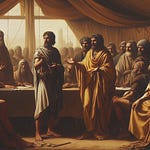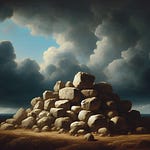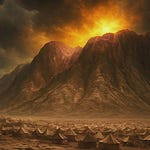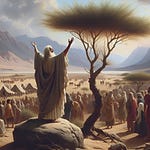Chapter Summary
Have you ever felt that your lack of education was a hindrance to your service to God?
In Exodus 3, despite being learned in all the wisdom of the Egyptians, Moses needed 40 years in the school of God before he could accomplish his calling.
Commentary
vv. 1–12 - 40 years have passed (Exodus 7:7) and we are told that Moses is keeping the flocks belonging to his father-in-law. Perhaps this is a subtle indication that Moses had not lost hope of delivering the Hebrews. If he had, his ambition would have likely resulted in building up his own flocks. We’re told that he is at Horeb, sometimes referred to as Sinai. Here, the God who met with Abraham, Isaac, and Jacob meets with Moses. A pre-incarnate revelation of the Son of God appears unto Moses “in a flame of fire out of the midst of a bush.” This “angel of the LORD” is referred to as Jehovah and God in v. 4. Initially, Moses looks out of curiosity, and it is then that God calls to him, tells him to keep his distance and remove his shoes. He then reveals Himself as the covenant-keeping God of his fathers, declares His awareness of the suffering of the Hebrews, and indicates that it is time to fulfill His Word and bring the people into Canaan. The relevance of this to Moses is in v. 10, “I will send thee unto Pharaoh, that thou mayest bring forth my people the children of Israel out of Egypt.” Moses, greatly humbled by 40 years of isolation and obscurity, questions the call.
vv. 13–15 - as Moses contemplates the call, he questions God for the second time. How can he give clear identification that the God who has sent him is the same God of their fathers? In a day of rife polytheism, can Moses explain the nature of this God? God says I AM, revealing Himself as self-existent, eternal, and that He not only is what He is at present, but what He always has been and shall be. But rather than try to convince every Hebrew on his own, Moses is directed to speak with the elders. If he can convince them, he will get the ear of the people.
vv. 16–22 - we learn how God further reassured Moses by telling him what to expect. He does not deny the difficulty, stating “And I am sure that the king of Egypt will not let you go.” We will eventually see the difficulty Moses faced. Nearly all who leave with Moses will die in the wilderness due to unbelief. Even Moses will not make it to the promised land. But there is no room for failure in what God says. Their persecutors are going to be devastated and plundered, as if conquered in warfare. This is signified by the fact they can expect to leave with Egyptian loot even though they will not lift so much as a sword against them.
Application
Christ is the eternal God. As the Mediator, every visible representation of God in the Old Testament is a revelation of the Son of God. Remember, the Father, the Son, and the Holy Ghost are one true, eternal God, the same in substance, equal in power and glory. The Larger Catechism teaches, “The Scriptures manifest that the Son and the Holy Ghost are God equal with the Father, ascribing unto them such names, attributes, works, and worship, as are proper to God only.” That means, boys and girls, that when we read Jesus state “I am the bread of life,” “I am the good Shepherd”, “I am the door,” “I am the light of the world,” “I am the way, the truth and the life,” “I am the resurrection and the life,” “I am the true vine,” He is identifying Himself as the divine and eternal “I am” who is “the same, yesterday, and today, and forever” (Heb. 13:8). This is why we worship Him as God and submit to Him as Lord of our lives. We also learn from Jesus in the New Testament that what is taught here implies the reality of resurrection, because it is not that God WAS the God of Abraham, but He IS. Abraham lives on awaiting the resurrection. I can’t wait to meet Abraham.
A holy God can meet with unholy men in their common employments. Moses is instructed to remove his shoes as a cultural sign that he was in the presence of a powerful sovereign. But because of His faith in the coming Christ, Moses is not burned up in the presence of this infinitely holy God. God condescends to commune with him. Just as the shepherds were keeping their flocks when the angel announced our Savior's birth, so God met with Moses in the midst of his daily employment. Time alone with God is necessary, but a monastic view of life which keeps men from productive employment fails to take account of Adam’s high calling to tend and keep the garden of Eden. Get alone with God, but also have the presence of mind to look for Him as you work. God will meet with working men who live mindfully in fellowship with Him.
Maturity makes men think more soberly about their abilities. When Moses was 40, after the best education available in the world, he thought he was ready. When he is 80 he is unsure. Evidently, it was nothing to do with his physical abilities. It was a keener sense of the difficulties in himself and in the task. At 40, in the flesh he thought he could do it. At 80, in the Spirit, he was more moderate. Remember, it takes approximately 20 years of good example to lay a foundation in a person to become a parent. Be not hasty in taking on responsibilities, nor be reluctant when God says go. If God has called you to some particular service and you feel insufficient, take His promise to heart, “Certainly I will be with thee.”
Christ identifies with His suffering Church. For years, the Jews and the Scottish Presbyterians have viewed the burning bush as a symbol of the people of God flourishing despite the fires of persecution. v. 7 speaks of God seeing, hearing, and knowing all that His people were experiencing. In “Isaiah 63:9 we read, “in all their affliction He was afflicted, and the Angel of His presence saved them.” This leads to v. 8, which typifies the incarnation, where God comes down to deliver His people and provide them with the blessings of a heavenly Canaan.
Redemption requires that Christ be made a curse for His people. As mentioned, the burning bush is a revelation of the Son of God. Fire signifies God in His divine judgment. The word for “bush” in Hebrew signifies a bramble or thorn bush and typifies Christ in His humanity being made a curse. This makes the burning bush a foreshadowing of the cross where Christ, who was made a curse for us, bore the judgment of God for sin. Only He could do that without being consumed. Thus, all the promised mercy to the people of God revealed to Moses is on the basis of Christ’s finished work. So it is for all the people of God to this day. Children, if you want God’s blessing, go to the cross. Go there every day.
The purpose of redemption is to serve and worship God. God’s deliverance of sinners is not merely to grant a ticket to heaven, but it is a high call to his rational creatures to serve and worship the living God with all their hearts (vv. 12, 18). Perhaps today God is calling you to more consecrated service. May I encourage you, by God’s grace, to disconnect to the Pharaohs of your life? The relationships, pastimes, and other distractions which exercise their tyranny in preventing you from being at your best for God must be surrendered. So today, bid adieu to every compromise and dedicate your life to serve God.
“God had seen and God had heard, as if their griefs had had two avenues to his heart… When the sorrow is known, then God begins to work. He is no passive spectator of the misery of his chosen, but his hand goes with his heart.” — Charles Spurgeon











